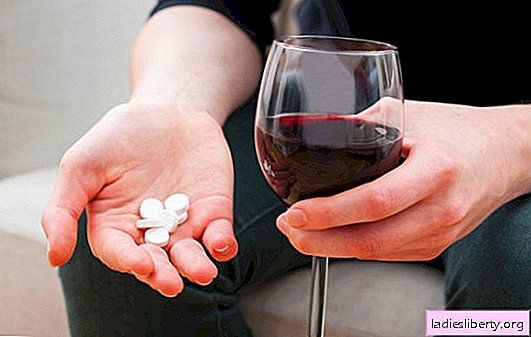
Every sane person is aware of the dangers of alcohol for the body, however, many do not want to refuse to take it even at a time when they have serious health problems and the doctor prescribed them a course of antibacterial therapy. Despite the fact that alcohol and antibiotics are absolutely incompatible, many still wonder how serious the consequences of such an interaction can be, or how long after taking a course of antibiotics can you start drinking alcohol?
The interaction of alcohol and antibiotics in the body
Even in biology classes from the school curriculum, we were told that all substances when they enter the body begin to break down into simpler parts. This cleavage chain continues until only the original parts, that is, proteins, carbohydrates, fats and amino acids, remain from the substance.
The molecules contained in alcohol will also break down into their parts, and it often happens that they can coincide with antibiotic molecules. Such mixtures can lead to a malfunction in the body and some systems and organs in it will begin to function incorrectly.
For example, if you take alcohol in conjunction with the drug "Trichopolum", the body can perceive such a mixture as the substance "teturam". The fact is that these substances have a very similar chemical formula, and this can very negatively affect the human body. A person’s heart rate may accelerate, heart pain will appear, and the brain will begin to function worse, dulling sensations and feelings. Therefore, the consequences can be very sad.
Such combinations can also lead to problems such as:
- increased load on the liver;
- nausea, dizziness, vomiting;
- severe headaches, clouding of the mind;
- the development of an allergic reaction.
How much alcohol can you take after a course of antibiotic treatment
Naturally, we are all people with our small weaknesses, and there are occasions, important holidays, when the desire to drink alcohol prevails. However, if you are taking antibacterial therapy during this period, you should still give up alcohol.
1. During the course of antibiotic treatment, the human body is very weakened. Apart from infections that suppress the immune system, antibiotics also put a serious strain on the heart, liver, and kidneys. In addition, they can seriously harm the gastrointestinal tract, in particular, the intestinal microflora. And if at the same time “to finish off” the body with alcohol, some organs, in particular the kidneys and liver, may simply not withstand the load. All this is subsequently fraught with serious diseases such as acute renal or liver failure. A man is not an enemy of himself, so stupidly "ruin" his body.
2. The intake of alcoholic beverages by 100% will reduce the effectiveness of antibiotic therapy to almost zero. The reason is that the bacteria that are affected by alcohol will get resistance, in other words, they will become absolutely immune to the drug. Thus, in order to get rid of the infection, a person will be forced to take stronger drugs of a new generation, which, in addition to even bigger health problems, can also “hit your pocket”. In addition, there are far from single cases when, after several doses of alcohol, bacteria become resistant to the entire treatment, and the person eventually dies from sepsis.
These are the main reasons why a person should stop drinking alcohol during and a short time after a course of treatment. After all, some bacteria (their spores) for some time remain in the focus of infection. In addition, it is not worth it to once again overload your already weakened body.
How much alcohol can you drink after antibiotics: why can't you combine it?
The pharmacology market has a huge number of antibacterial drugs, each of which has a different active substance, but the mechanism of action is the same - the destruction of pathogenic bacteria. Most people are extremely skeptical of antibacterial drugs, since taking them can seriously harm the human body, and even a single drink of alcohol can cause a simply destructive force. The fact is that alcohol enhances the side effects of antibiotics, thereby significantly reducing their productivity. In addition, a mixture of alcohol and antibacterial drugs can seriously damage the liver, which simply can not cope with two toxic substances at once.
A curious fact: even the majority of professional doctors and chemists cannot 100% say what kind of reaction the body will follow with a mixture of ethyl alcohol and the active substance of antibiotics. Pharmacological companies do not even do special tests, as they are completely sure that no one will risk combining these substances. In fact, the truth is that most people do not risk combining these components, but there are also those types of people who believe that nothing terrible will happen.
However, as we see, alcoholic beverages have a serious impact on the functioning of the human body and can seriously disrupt the body.
Also, a mixture of alcoholic beverages and antibacterial drugs can lead to allergies, and even if a person’s immunity can cope with the load of drugs, drinking alcohol can completely impair its function, which is subsequently fraught with an allergic reaction. Even cases of serious complications are known that even led to death. Intolerance to the drug can occur at any time, and taking such a risk is very dangerous.
At the same time, the effect of alcohol during the period of taking antibacterial drugs increases, a person immediately gets drunk, but a hangover syndrome can last more than one day. In addition, antibiotics are drugs of the drug group, and there is a chance of addiction.
How long after taking antibiotics can I drink alcohol?
An individual course of sobriety is provided for each type of antibiotic. In some cases, you can start drinking alcohol already a day after the end of the course of treatment, in others it is recommended that the extract be at least ten days old. In any case, specialists are reinsured, and recommend abstaining from alcohol for at least 10-15 days in order to avoid possible undesirable consequences.
Most often, the duration in this case is always indicated on the package. For example, the antibiotic Trichopolum needs to abstain from alcoholic beverages for at least a week. All cases are individual, so it will be preferable to listen to the advice of a doctor. If the patient has problems with the kidneys or liver, the period of abstinence should be extended to avoid possible complications.
In any case, if you monitor your health and undergo antibiotic treatment, you should completely abandon alcohol, otherwise the consequences can be dire.











